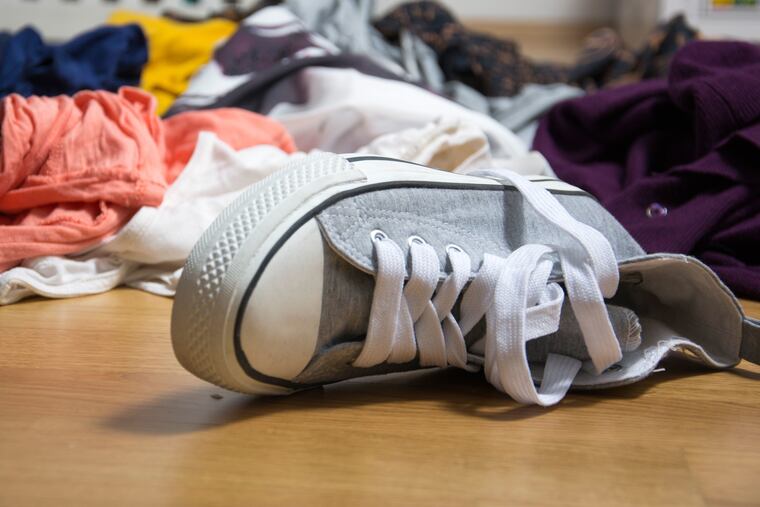Everything has its place — and that place is not the floor
Drawers, shelves, cabinets and closets are all storage spaces. Your floor is not.

Drawers, shelves, cabinets and closets are all storage spaces. Your floor is not.
More and more, I’ve noticed people using their floor to store clothing, books, paper, wine, serving dishes and more. If you are using the floor to regularly store certain items, you need to address some basic organizing issues.
People resort to creating piles on the floor for several reasons. Either they have too much of something and no room to adequately store the overflow, or they have adequate space, but it’s too disorganized to use properly. Sometimes, the floor serves as a holding area while they ponder whether to get rid of something, which can sometimes take weeks or months.
The first question to ask yourself is why you’re storing items on the floor. This can be harder for some people to answer than you might imagine. Have you run out of space on your bookshelves, or are your bookshelves located somewhere you don’t actually read? Is your closet or dresser packed with clothing you never wear, and it’s easier to keep frequently worn items out in the open? Are those serving dishes tucked away on the floor of the hall closet because you never use them but can’t part with them?
When clutter lines the perimeter of a room, people will frequently buy a bunch of boxes, bins and baskets to corral the items lining their walls, either to make the piles less unsightly or to store the items in a basement or attic. But these are only temporary solutions that don't get at the root of the problem.
Instead of buying more stuff, begin by fully accounting for all the items in the offending category. Be honest with yourself while deciding what you need to keep and will use, and toss or donate the rest. Once you know what you have, you'll be able to determine whether you can fit everything into a designated space or whether you need to buy additional furniture or storage bins. Usually, the best solution is to get rid of some items to match your existing storage capacity, instead of buying something that will allow you to store more of that item.
If your closet is disorganized, making it difficult to put your clothes away or to find what you’re looking for, the first thing to do is go through your wardrobe and donate or discard what you can. Only then will you be able to figure out the best way to store what remains. You may discover you need more hanging space, fewer shelves, or more drawers to accommodate the overflow on the floors, but you can’t know that until you’ve taken a comprehensive look at all your clothing. Once you’ve cleaned and organized the closet, the new rule has to be that nothing gets stored on the floor again. Even adding some simple hooks to hang clothes can make a big difference.
If your home office floor is covered in paper, it's a sign that you're either keeping too much paper or that you don't have adequate filing space. Sometimes it's both. Most people don't file because their cabinet is packed, so start by going through your existing files and purge. Recycle or shred what you can, and move the papers you need to keep for the long term to waterproof bins. Then create new files to accommodate current papers and move everything from the floor to a filing cabinet. Everyone needs one filing cabinet to keep their current papers. If you don't have one, buy one. Current papers can be kept in wall pockets or in a desktop file box. Once you have a system set up with enough space to accommodate new documents, keeping papers off the floor should be a breeze.
Having stuff on the floor of your home is not egregious, but it’s also not optimal. Items left on the floor get dusty very quickly and can be hazardous to your ability to get around your home safely. Stacks and piles on the floor are not likely to produce calming feelings, either. The mess can leave you feeling a lack of control over your possessions. Most important, it’s better to have an actual storage space for everything and to be able to put everything in its place — one that isn’t on the ground.
Nicole Anzia is a freelance writer and owner of Neatnik. She can be reached at nicole@neatnik.org.